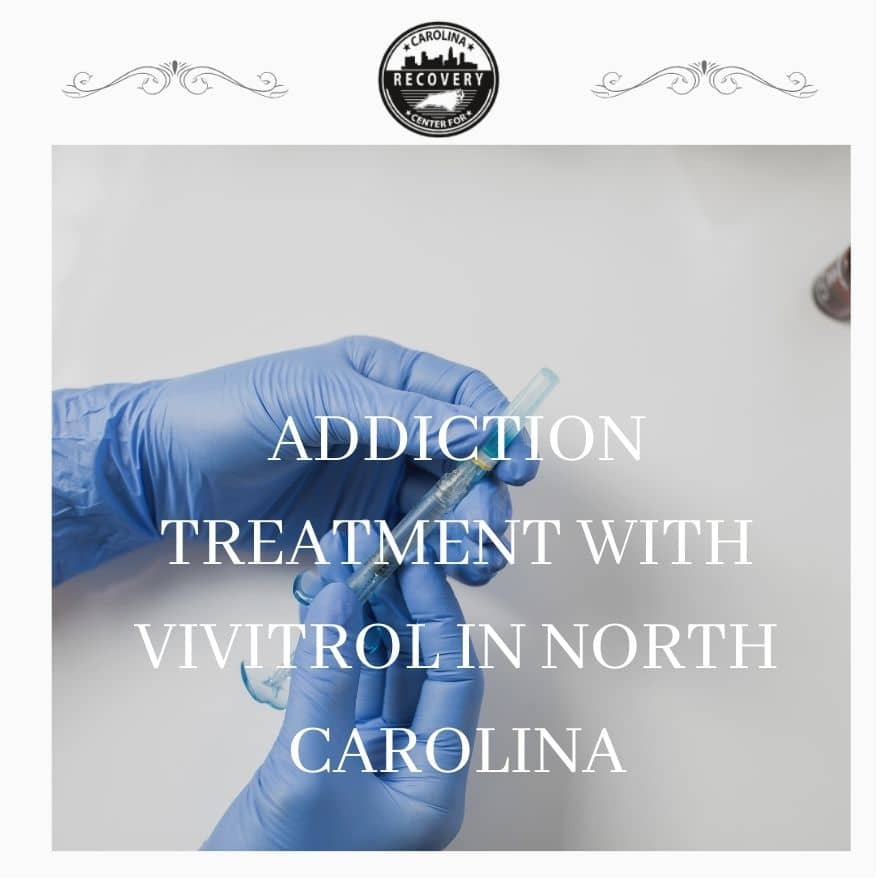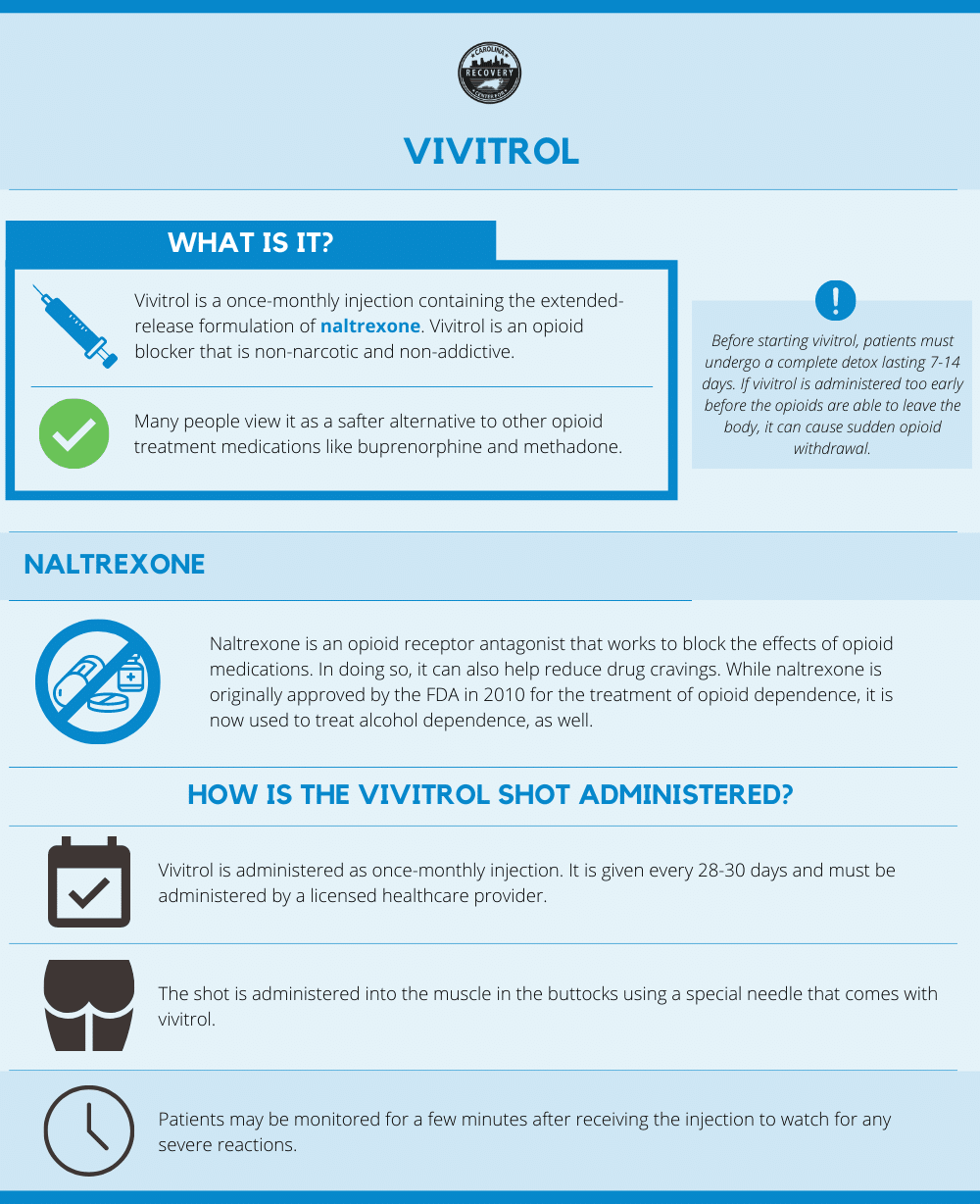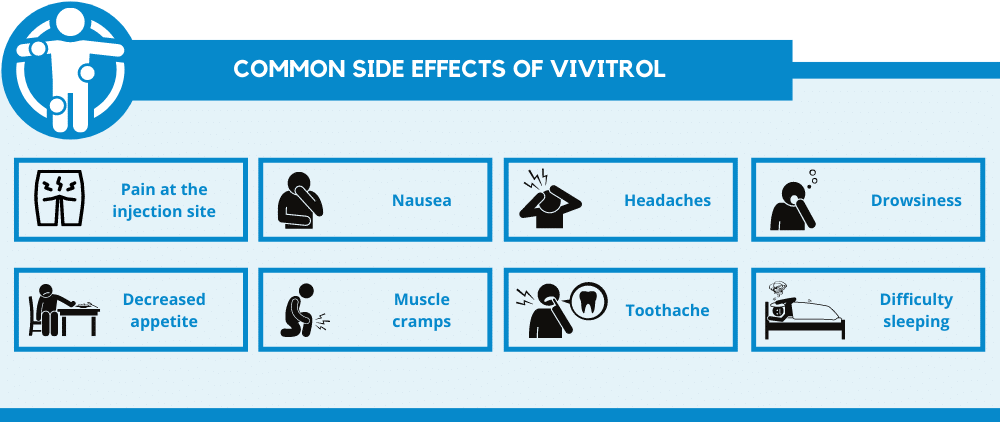Addiction Treatment With Vivitrol in North Carolina

Medically Verified: 2/1/24
Medical Reviewer
Chief Editor

All of the information on this page has been reviewed and verified by a certified addiction professional.
Overcoming an addiction to alcohol or opioids can be challenging. Not only do patients have to get through the withdrawal stage, but they also have to change their behaviors, address underlying conditions, and learn how to cope with cravings. While there are many FDA-approved treatment medications that are used to treat alcohol and opioid use disorder, many of these are habit-forming and come with some sort of risk.
Vivitrol, on the other hand, is touted as a safe and non-addictive treatment for opioid and/or alcohol dependence. Vivitrol treatment programs in North Carolina combine this medication with counseling, behavioral therapy, and aftercare support to help aid individuals in their recovery journey.
Understanding Vivitrol
Vivitrol is the first FDA-approved, once-monthly injection used in the treatment of opioid and alcohol use disorders. The injection contains a single active ingredient: naltrexone.[1] Naltrexone is an opiate antagonist that occupies opioid receptors in the brain, blocks them from responding to the euphoric effects of opioids, and helps normalize brain chemistry after opioid or alcohol abuse.
Naltrexone has been used for many years in pill form to treat addictions to opioids and alcohol. It is sold under the brand names ReVia and Depade.[2] While these medications must be taken once daily, Vivitrol is a monthly injection that patients only receive every 28-30 days. This can help increase medication adherence and prevent drug abuse.
When combined with an individually-tailored treatment program that involves counseling and behavioral therapy, Vivitrol can help prevent relapse and improve treatment outcomes.

How Does Vivitrol Treatment Work in North Carolina?
Before starting Vivitrol, patients must detox completely. Taking Vivitrol while opioids or alcohol are still in the system can result in painful, precipitated withdrawal symptoms. After detox is complete, patients visit their doctor for an injection each month as they participate in counseling and behavioral therapy to overcome their addictions. This approach that combines therapy and medications is widely known as medication-assisted treatment (MAT).
While counseling and therapy aim to treat the causes of a person’s addiction, Vivitrol helps normalize brain chemistry and reduce cravings. It does this by occupying the brain’s opioid receptors and regulating endorphin production. Medication-assisted treatment (MAT) is thought to have many benefits, such as improving treatment retention and outcomes, reducing criminal behaviors and opioid use, and discouraging substance abuse.[3]
What to Expect During a Vivitrol Treatment Program
Vivitrol treatment programs in North Carolina consist of four key aspects: detox, the Vivitrol shot, individualized counseling, and aftercare planning.
Detox
Withdrawal from opioids and alcohol can be uncomfortable and severe. It is never advised to detox at home. Although Vivitrol cannot be administered during detox, other medications can be used to alleviate withdrawal symptoms and prevent adverse side effects.
Medical detox centers can prescribe detox medications, administer them in a safe and controlled manner, and monitor patients’ symptoms to ensure their comfort and safety. Detox typically lasts 5-7 days, though patients with severe withdrawal symptoms may need more time under medical supervision.
Monthly Vivitrol Injections
Patients must avoid opioids and alcohol for 7-14 days before they can receive their first Vivitrol injection.[4] When it is time to get the shot, patients will visit their doctor, learn about the medication and its side effects, and get the injection.
Vivitrol is an intramuscular injection that is administered in the buttocks. The most common side effect is injection site reactions including bruising, pain, redness, and itching at the injection site.[5] Injection site reactions are entirely normal and usually fade within a couple of days or weeks. Other common side effects include:

- Nausea
- Headache
- Sleepiness
- Decreased appetite
- Muscle cramps
- Toothache
- Difficulty sleeping
Vivitrol treatment programs in North Carolina monitor patients very closely for rare adverse side effects.
Individualized Care
The Vivitrol shot alone cannot effectively treat addiction. It can reduce drug and alcohol cravings and discourage substance abuse, but it does not address the underlying causes of addiction or supply individuals with the coping skills and resources they need to stay sober. That’s what behavioral therapy and counseling are for.
In order for treatment to be effective, it must be custom-tailored to meet a patient’s needs. When patients first begin addiction treatment with Vivitrol, they go through a comprehensive assessment to determine their strengths, weaknesses, and underlying conditions. Therapies are then adapted to meet the patient’s unique needs.
Aftercare Planning
Recovery from addiction is a long-term process. Before leaving treatment, patients will meet with their therapist to come up with an aftercare plan suited to their needs. Aftercare may involve sober living, ongoing therapy, 12-Step meetings, mental health counseling, and more. Some people will continue taking Vivitrol after they leave rehab, so the aftercare planning process will also discuss ongoing Vivitrol injections.
Find a Vivitrol Treatment Program in North Carolina Today
Here at Carolina Center for Recovery, we aim to supply each of our patients with the tools and resources they need to stay sober. Whether you’re interested in recovering from addiction with Vivitrol or not, we have versatile addiction treatment programs that can meet your needs. Don’t hesitate another minute. Call now to speak with an admissions coordinator about getting started on your recovery.
References:
- https://www.accessdata.fda.gov/drugsatfda_docs/label/2010/021897s015lbl.pdf
- https://www.nami.org/About-Mental-Illness/Treatments/Mental-Health-Medications/Types-of-Medication/Naltrexone-(ReVia)
- https://www.samhsa.gov/medication-assisted-treatment
- https://www.ihs.gov/sites/opioids/themes/responsive2017/display_objects/documents/naltrexonecpapolicy.pdf
- https://www.ncbi.nlm.nih.gov/pmc/articles/PMC5266530/

